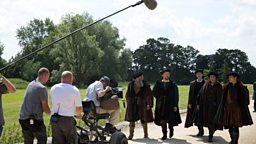Hilary Mantel: "Good drama doesn’t have to mean bad history"

Hilary Mantel is a critically acclaimed author, whose books Wolf Hall and Bring Up the Bodies have won her two Man Booker Prizes. The TV adaptation of these works follows the highly successful staging of the novels by the Royal Shakespeare company in London - with a Broadway production launching soon. Here, the author discusses the process of transferring her words into a performance medium.
How does it feel to have your books turned into both television and stage productions?
It’s a privilege. It’s illuminating, exciting. It’s not, as people sometimes think, in any way odd or jarring. It seems to continue a natural process that goes on in the writer’s head. As you write, you see and hear. To have the images transferred to the outside world, to hear the voices externally, is a kind of magic, but it’s also a logical step. The play, the film, already exists inside you. The art is to work with people who will help you relocate that inner reality and put it where others can share it.
Did you have any stipulations or unvoiced fears?
I wanted to know that both teams, for the stage and TV versions, shared my values. It’s a fundamental belief of mine that good drama doesn’t have to mean bad history. History is never a convenient shape, it’s true. But if you have the craft and the will to do it, you can find a way to tell a good story without distortion and find the dramatic shape in real events.
What was it like watching the television adaptation for the first time? Did it fulfil your expectations?
My expectations were high and have been exceeded: in the concision and coherence of the storytelling, in the originality of the interpretations, in the break from the romantic clichés of the genre, in the wit and style and heart. Having seen Peter Straughan’s scripts at every stage, and knowing Peter Kosminsky’s work and admiring it as I do, I was confident. Yet also curious to see how my imagination matched theirs. Particularly with characters where there is no portrait, where my books had to conjure them from thin air: how would they appear? As the final product unfolds, every face seems to me one that Holbein would recognise, even if he didn’t paint it.
Did the historical accuracy of locations, costumes and settings impress you?
I spent a fascinating hour or two in the trailers with the costumes, turning them inside out and examining every stitch. The leather was aged, the fabrics were specially woven. Even the pins were specially hand-made to an authentic pattern and my husband is carrying one around in his wallet as a sort of talisman; pins held the Tudors together. There’s no doubt that an unseen army was at work behind the scenes, on every aspect of the production, and I owe them gratitude.
What conversations did you and Peter Straughan have before he started adapting the books?
At our first meeting, I became aware that Peter understood the books very well, that he liked them, that he could go and live inside them. By what seemed a miracle, he hit the tone of the novels with his first draft; he heard their note, and sustained it. As he moved through the drafts, we discussed how to compact the more intricate parts of the narrative, and how to be clear while preserving the original’s ambiguity; Thomas Cromwell is not a character you can add up. There’s a huge difference between the dialogue in a novel and the dialogue in a film. Both should carry the story forward and define character in every line; but they do different jobs.
Bits and pieces transfer happily, and I was pleased to learn that Mark Rylance and other cast members had often requested lines from the original. But Peter and I think alike: we want less, less, always less. A glance, a blink, a smile, will carry the story on film. What dialogue remains should be pared down to spare elegance.
What elements do you feel Peter Kosminsky brought to the production?
If there’s one director I would have chosen, it’s he. He is a political animal, as I am, with a style of filmmaking that is often documentary in tone. He knows how politics play in human terms and he knows how to pinpoint the acute moral dilemmas that the exercise of power creates. Just when you are settling into one of his stories, just when you think, ‘I know where this is going', he will surprise you; you have to think again. He has brought visual flair without affectation, and a searching intelligence. Like Peter Straughan, he doesn’t patronise the characters, he doesn’t think they’re cute because they’re Tudor. He treats them with the consideration one would give to contemporaries. He knows they are enacting their own lives, their one-shot lives, the only lives they have: urgently, joyfully, bitterly, without foreknowledge, ignorant of what’s around the corner. He knows that our past is their present.
Can you describe the experience of visiting Wolf Hall on location?
I was staggered by the scale of the enterprise, it was like a royal progress. There seemed something very appropriate about the way it lumbered across the English countryside, stopping at the most beautiful houses, bringing its own provisions, feeding and watering itself as it went; and then so many people instantly taking up their assigned roles, all moving purposefully around each other, all on their interweaving circuits, all with a common object, and so many of them bright and vivid in Tudor dress against the green of the English summer: wearing their clothes as if they lived in them.




